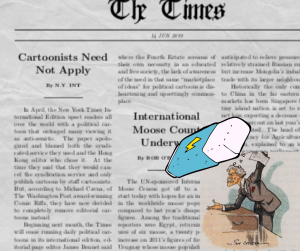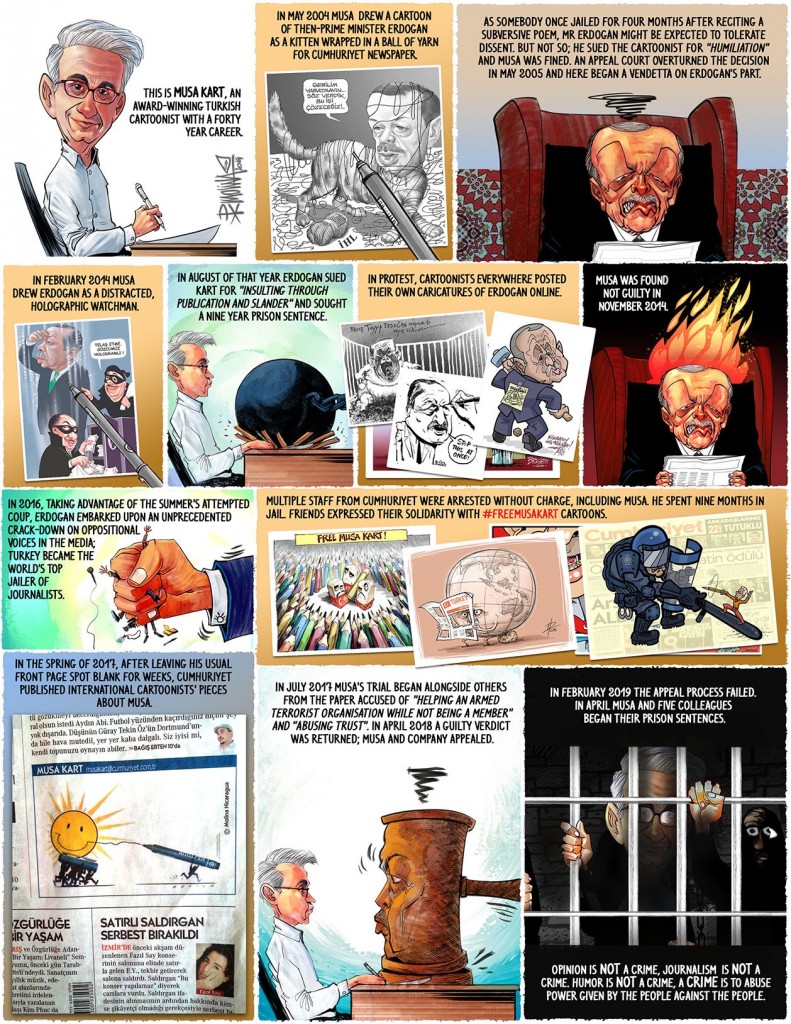 In April, the New York Times International Edition upset readers all over the world with a political cartoon that outraged many viewing it as anti-semitic. The paper apologized and blamed both the syndicated service they used and the Hong Kong editor who chose it. At the time they said that they would cancel the syndication service and only publish cartoons by staff cartoonists. But, according to Michael Cavna, of The Washington Post award-winning Comic Riffs, that decision is moot since they are no longer employing any cartoonists.
In April, the New York Times International Edition upset readers all over the world with a political cartoon that outraged many viewing it as anti-semitic. The paper apologized and blamed both the syndicated service they used and the Hong Kong editor who chose it. At the time they said that they would cancel the syndication service and only publish cartoons by staff cartoonists. But, according to Michael Cavna, of The Washington Post award-winning Comic Riffs, that decision is moot since they are no longer employing any cartoonists.
Beginning next month, the Times will cease running daily political cartoons in its international edition, editorial page editor James Bennet said Monday in a statement — a move that brings the overseas newspaper “into line with the domestic paper,” which in recent years had ceased running weekly roundups of syndicated cartoons and experimented instead with longer-form editorial comics.
One of those longer-form comics, Welcome to the New World, won a Pulitzer Prize, so the move may not be the end of the world for sequential art, but it still feels like another nail in the coffin of editorial cartoons.
The Times says that change was not motivated by the recent controversy and that they had been talking about making this cut for the past year. Despite the suspicious timing, it seems entirely likely that they were considering cutting their staff cartoonists for the last year, as each year it seems there are fewer and fewer full-time cartoonists employed by newspapers, and less work to be split across the many talented freelancers in the market. At a time where the Fourth Estate screams of their own necessity in an educated and free society, the lack of awareness of the need in that same “marketplace of ideas” for political cartoons is disheartening and upsettingly commonplace.
In 1957 there were 257 full-time political cartoonists working for newspapers, in 2012 a survey demonstrated that that number had plummeted to just 40. Patrick Chapette, one of the two in-house cartoonists the Times is letting go, took to his blog to talk about the decision.
Who will show the emperor Erdoğan that he has no clothes, when Turkish cartoonists can’t do it? – one of them, our friend Musa Kart, is now in jail. Cartoonists from Venezuela, Nicaragua and Russia were forced into exile. Over the last years, some of the very best cartoonists in the U.S., like Nick Anderson and Rob Rogers, lost their positions because their publishers found their work too critical of Trump. Maybe we should start worrying. And pushing back. Political cartoons were born with democracy. And they are challenged when freedom is.
Chapette is right on so many levels. In a world where cartoonists, like the wonderful Musa Kart, are jailed for their work, and people who posted Kart’s work to their social media feeds years ago are now being sentenced to prison as well. Hundreds of people in Turkey await trial for the crime of insulting Erdoğan. The world needs more political cartoonists, not less. And American newspapers should be leading the charge to bring back cartoons that speak truth to power, show ideas that spark debate, and visuals that can communicate without a common language that there are problems that must be addressed.
#FreeMusaKart

